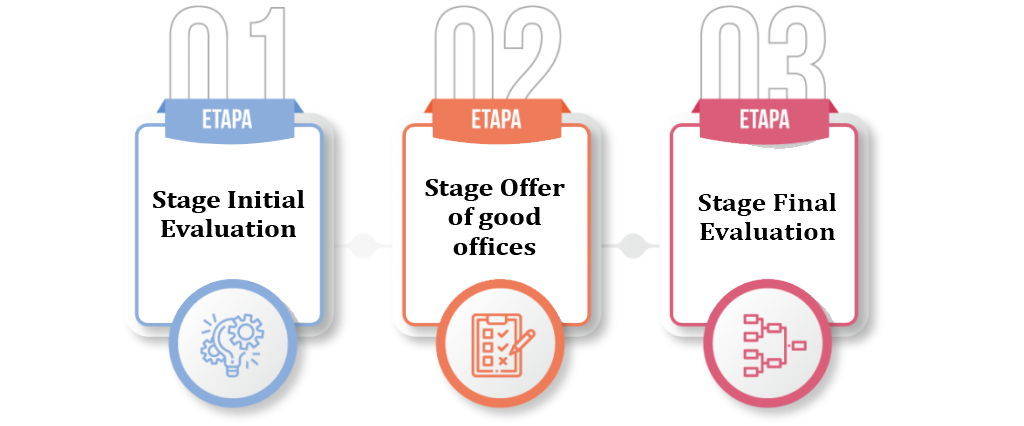SPECIFIC INSTANCES
Home > Specific Instances
National Contact Points (NCPs) offer a platform for dialogue to help resolve cases of possible non-compliance with the OECD Guidelines for Multinational Enterprises (Guidelines). These cases are called “Specific Instances”.
The Specific Instances are not civil, criminal or administrative cases, since NCPs do not have a jurisdictional function. Therefore, the NCPs cannot impose sanctions, determine crimes, award compensation directly or force the parties to participate in the dialogue process.
This process must be consensual and seeks to identify that it is the parties, not a third party, who seek constructive solutions and mutual agreements.
Presentation of a Specific Instance
Any person or organization that considers that the OECD Guidelines are being violated by a multinational company that operates in Peru, or by a Peruvian company that operates in any other country, can present a Specific Instance to the Peruvian NCP.
The Specific Instance must be presented at the reception of PROINVERSION Headquarters located in Lima in Canaval Moreyra 150 Avenue, San Isidro (where the Peruvian NCP is located) or to the email pnc-ocde-peru@proinversion.gob.pe; by means of a letter or communication addressed to the Peruvian NCP, which must include the following information:
a.
Identification of the natural or legal person that presents the Specific Instance, including the physical or email address where they authorize the notifications corresponding to the Specific Instance to be sent to.
b.
Explanation of the specific interest in the Specific Instance presented.
c.
Company name and fiscal domicile of the Multinational Company that is allegedly not complying with the Guidelines, as well as information about the organizational structure of the Company, if relevant for the Specific Instance.
d.
Description of the facts that would be causing the non-compliance with the Guidelines, including the documents that support it, identifying the place or places where the non-compliance with the Guidelines would have occurred or would be occurring; and its relationship with the specific provisions that would be violated
e.
Actions they believe the Company should take to remedy the possible breach of the Guidelines.
f.
The indication of the other instances where the specific case or the facts that support it are being analyzed, including administrative and judicial procedures, as well as their status.
g.
Declaration of their intention to seek an amicable solution in the eventual specific case, in accordance with the procedures established in the Guidelines and in these regulations.
h.
Any additional information considered relevant for the analysis of the Specific Instance.
Procedure of a Specific Instance
The Specific Instance will be developed in accordance with the provisions of Directive N° 003-2015-PROINVERSION and the OECD Guidelines for Multinational Enterprises, as well as in the Commentary on the Implementation Procedures of the OECD Guidelines for Multinational Enterprises, in 3 stages and will respect the principles of impartiality, predictability, fairness and compatibility.
Stages

Stage 1: Initial Evaluation
At this stage, the natural person or organization requires the start of a Specific Instance, by sending the SI Form (Specific Instance) duly completed.
The NCP may request further information, when necessary.
The Initial Evaluation carried out by the NCP aims to determine if the Specific Instance deserves further consideration, and if it has been presented in good faith and is related to the Guidelines.
The criteria established in numerals 25 and 26 of the » Commentary on the Procedural Guidance for NCPs», contained in the Guidelines, will be followed. Likewise, the NCP will not decide that the Specific Instance does not deserve further consideration, just because the facts dealt with in it are found or have been considered in a parallel process.
The following scenarios may occur:
1.
1. The Specific Instance does not meet the criteria to proceed to the next stage: an Initial Evaluation Report is issued, as well as a closing note of the instance. The identity of the parties and any confidential information exchanged must be kept confidential.
2.
2. The Specific Instance deserves further consideration: an Initial Evaluation Report is issued. The NCP offers its good offices to facilitate a forum for dialogue that allows the parties to reach a consensual agreement. It should be noted that these currently do not involve professional conciliation or mediation services. The parties must expressly accept the good offices of the NCP.
This stage shall last three months approximately. The period of three months will be counted from the moment the NCP informs the Solicitant that their application has been accepted. At this stage, the NCP does not determine that the guidelines have been violated.
Stage 2: Offer of Good Offices
Once the parties have decided to accept the good offices of the NCP, the NCP will meet with the parties individually, initially, in order to decide the points to be discussed in the dialogue process. The NCP will be a dialogue facilitator so that the parties can reach agreements that help resolve the Specific Instance.
The parties can reach an agreement at any time during this stage, as well as withdraw from the dialogue forum, or withdraw the request for a specific instance. This stage lasts up to 6 months.
Stage 3: Final Evaluation
Whether the parties have reached an agreement or not; and in the latter case, if an agreement cannot be reached after six months, the parties will be informed that the dialogue stage is closed and a Final Evaluation Report will be issued, as well as a closing note. This stage lasts up to 3 months.
The natural person or organization that decides to submit a request for a Specific Instance commits to the guidelines established in the Directive.
KNOW THE CURRENT DIRECTIVE
Specific instances presented to the NCP
In this section you can find all the reports regarding the Specific Instance presented to the National Contact Point (NCP):
a) CUT / Perubar S.A. *
Final Report. Read it here
b) CUT-SITENTEL-PLADES / Telefónica del Perú Group*
Final Report. Read it here
c) Cooperation, Movement for Health in La Oroya, FORUM Solidarity, Red Uniting Hands Peru, OXFAM AMERICA/PERU and OXFAM/Washington / Doe Run Peru SRL and The Renco Group *
Final Report. Read it here
d) Case of a multinational company from the United States of America (hotel sector)
Initial Report. Read it here
Closing Note. Read it here
e) Former employees / Avianca Perú SA in Liquidation and Avianca Holdings SA
Initial Report.
Final Report. Read it here
Closing Note. Read it here
(*) The Directive by which the procedure for the attention of the Specific Instances presented to the NCP was established, was approved on December 4, 2015, after the presentation of the aforementioned Specific Instance. However, the Final Evaluation Report was prepared, in accordance with the steps taken and the provisions of said Directive.

